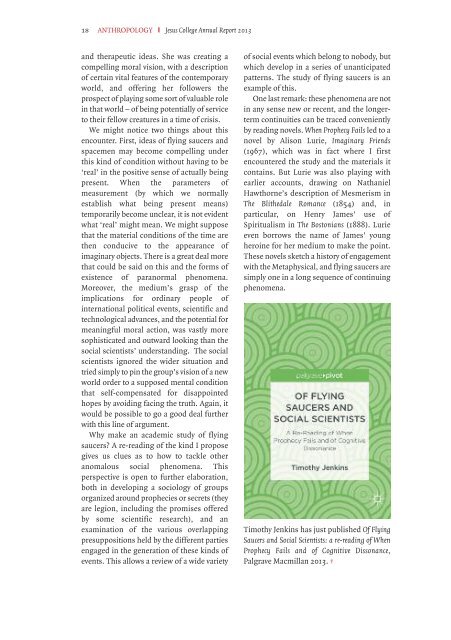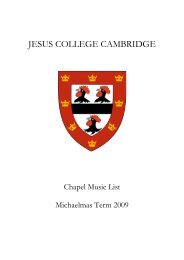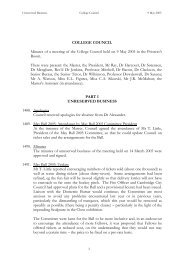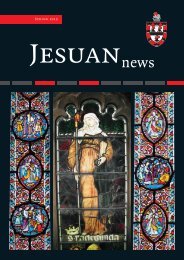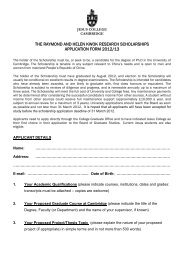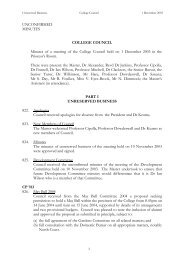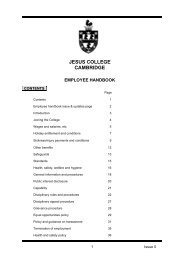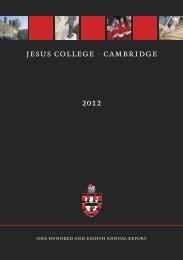2013 Annual Report - Jesus College - University of Cambridge
2013 Annual Report - Jesus College - University of Cambridge
2013 Annual Report - Jesus College - University of Cambridge
You also want an ePaper? Increase the reach of your titles
YUMPU automatically turns print PDFs into web optimized ePapers that Google loves.
18 ANTHROPOLOGY I <strong>Jesus</strong> <strong>College</strong> <strong>Annual</strong> <strong>Report</strong> <strong>2013</strong><br />
and therapeutic ideas. She was creating a<br />
compelling moral vision, with a description<br />
<strong>of</strong> certain vital features <strong>of</strong> the contemporary<br />
world, and <strong>of</strong>fering her followers the<br />
prospect <strong>of</strong> playing some sort <strong>of</strong> valuable role<br />
in that world – <strong>of</strong> being potentially <strong>of</strong> service<br />
to their fellow creatures in a time <strong>of</strong> crisis.<br />
We might notice two things about this<br />
encounter. First, ideas <strong>of</strong> flying saucers and<br />
spacemen may become compelling under<br />
this kind <strong>of</strong> condition without having to be<br />
‘real’ in the positive sense <strong>of</strong> actually being<br />
present. When the parameters <strong>of</strong><br />
measurement (by which we normally<br />
establish what being present means)<br />
temporarily become unclear, it is not evident<br />
what ‘real’ might mean. We might suppose<br />
that the material conditions <strong>of</strong> the time are<br />
then conducive to the appearance <strong>of</strong><br />
imaginary objects. There is a great deal more<br />
that could be said on this and the forms <strong>of</strong><br />
existence <strong>of</strong> paranormal phenomena.<br />
Moreover, the medium’s grasp <strong>of</strong> the<br />
implications for ordinary people <strong>of</strong><br />
international political events, scientific and<br />
technological advances, and the potential for<br />
meaningful moral action, was vastly more<br />
sophisticated and outward looking than the<br />
social scientists’ understanding. The social<br />
scientists ignored the wider situation and<br />
tried simply to pin the group’s vision <strong>of</strong> a new<br />
world order to a supposed mental condition<br />
that self-compensated for disappointed<br />
hopes by avoiding facing the truth. Again, it<br />
would be possible to go a good deal further<br />
with this line <strong>of</strong> argument.<br />
Why make an academic study <strong>of</strong> flying<br />
saucers? A re-reading <strong>of</strong> the kind I propose<br />
gives us clues as to how to tackle other<br />
anomalous social phenomena. This<br />
perspective is open to further elaboration,<br />
both in developing a sociology <strong>of</strong> groups<br />
organized around prophecies or secrets (they<br />
are legion, including the promises <strong>of</strong>fered<br />
by some scientific research), and an<br />
examination <strong>of</strong> the various overlapping<br />
presuppositions held by the different parties<br />
engaged in the generation <strong>of</strong> these kinds <strong>of</strong><br />
events. This allows a review <strong>of</strong> a wide variety<br />
<strong>of</strong> social events which belong to nobody, but<br />
which develop in a series <strong>of</strong> unanticipated<br />
patterns. The study <strong>of</strong> flying saucers is an<br />
example <strong>of</strong> this.<br />
One last remark: these phenomena are not<br />
in any sense new or recent, and the longerterm<br />
continuities can be traced conveniently<br />
by reading novels. When Prophecy Fails led to a<br />
novel by Alison Lurie, Imaginary Friends<br />
(1967), which was in fact where I first<br />
encountered the study and the materials it<br />
contains. But Lurie was also playing with<br />
earlier accounts, drawing on Nathaniel<br />
Hawthorne’s description <strong>of</strong> Mesmerism in<br />
The Blithedale Romance (1854) and, in<br />
particular, on Henry James’ use <strong>of</strong><br />
Spiritualism in The Bostonians (1888). Lurie<br />
even borrows the name <strong>of</strong> James’ young<br />
heroine for her medium to make the point.<br />
These novels sketch a history <strong>of</strong> engagement<br />
with the Metaphysical, and flying saucers are<br />
simply one in a long sequence <strong>of</strong> continuing<br />
phenomena.<br />
Timothy Jenkins has just published Of Flying<br />
Saucers and Social Scientists: a re-reading <strong>of</strong> When<br />
Prophecy Fails and <strong>of</strong> Cognitive Dissonance,<br />
Palgrave Macmillan <strong>2013</strong>.


